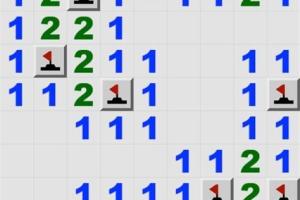Mastering Minesweeper: A Comprehensive Guide to Playing and Winning

-
Quick Links:
- Introduction
- Understanding the Game
- Gameplay Basics
- Strategies for Winning
- Common Mistakes to Avoid
- Advanced Techniques
- Case Studies
- Expert Insights
- FAQs
Introduction
Minesweeper is not just a game of chance; it is a game of skill, logic, and strategy. For many, it is a nostalgic classic that has remained popular since its introduction in the 1980s. In this comprehensive guide, we will explore how to play Minesweeper, strategies for winning, and the nuances that can elevate your game.
Understanding the Game
Minesweeper is played on a grid of squares, where each square can either contain a mine or be empty. The objective is to uncover all squares without detonating any mines. The game provides numerical clues indicating how many mines are adjacent to a specific square, assisting players in making informed decisions.
Game Elements
- Grid: The playing field, typically 8x8, 16x16, or 30x16 squares in standard games.
- Mines: Hidden threats that the player must avoid.
- Numbers: Indicate the count of adjacent mines for a square.
- Flags: Used to mark suspected mines.
Gameplay Basics
The gameplay of Minesweeper is simple yet requires strategic planning. Here are the basic steps:
Starting the Game
- Open the game and select the difficulty level.
- Click on a square to reveal it.
Understanding the Numbers
When you reveal a square, you may see a number (1-8) or an empty square. The number indicates how many mines are adjacent to that square. For example, a square labeled '3' means there are three mines in the surrounding eight squares.
Revealing Squares
As you uncover squares, you must deduce the locations of the mines based on the numbers. If you reveal a square with no adjacent mines, all surrounding squares will be automatically revealed, aiding in your strategy.
Using Flags
You can right-click (or use a designated button) to place flags on squares you suspect contain mines. This is a crucial part of the strategy as it helps keep track of your deductions.
Strategies for Winning
Winning at Minesweeper requires a blend of logical reasoning and strategic planning. Here are some effective strategies:
1. Start from the Corners
Beginning your game at a corner can often lead to revealing larger areas of the grid.
2. Use Logic
- If a square shows a '1' next to an unrevealed square, there is one mine in those squares.
- Deduce the location of mines by cross-referencing numbers from different squares.
3. Pattern Recognition
Familiarize yourself with common patterns, such as:
- 1-1 formations: When two '1's are adjacent, it indicates the mines are in the squares between them.
- 2-2 formations: Similar logic applies, but with added complexity.
Common Mistakes to Avoid
Many players make common mistakes that can lead to premature losses. Here are some to be cautious of:
- Random Clicking: Avoid clicking squares without reasoning.
- Ignoring Flags: Forgetting to flag potential mines can lead to errors.
- Not Using Logic: Failing to apply logical deductions can result in unnecessary losses.
Advanced Techniques
For those looking to elevate their Minesweeper game, consider these advanced techniques:
1. Probability Analysis
In situations where multiple squares could potentially contain mines, use probability to make informed guesses.
2. Use of Software
Some players use Minesweeper solver software to practice and improve their skills. These tools analyze patterns and provide solutions.
Case Studies
Several players have shared their experiences and strategies that led to consistent wins:
Case Study 1: The Corner Strategy
A player named John reported a 75% win rate by always starting in corners, allowing for maximal square reveals.
Case Study 2: Pattern Recognition
Another player, Sarah, shared her success in recognizing the 1-1 pattern, which helped her secure quicker victories.
Expert Insights
We reached out to Minesweeper experts for their insights:
Expert Opinion 1: The Importance of Patience
Expert Mike emphasizes the need for patience, suggesting that rushing can lead to mistakes.
Expert Opinion 2: Learning from Losses
Expert Linda notes that players should analyze their losses to understand where they went wrong, turning failures into learning opportunities.
FAQs
1. What are the basic rules of Minesweeper?
The objective is to clear a grid of concealed mines without detonating any.
2. Can you play Minesweeper online?
Yes, Minesweeper is available on various online platforms and websites.
3. How do you win at Minesweeper?
By using logic, strategic flagging, and carefully revealing squares, you can win.
4. What is a mine in Minesweeper?
A mine is a hidden square that, when clicked, ends the game.
5. Are there different difficulty levels in Minesweeper?
Yes, Minesweeper typically offers beginner, intermediate, and expert levels.
6. What happens when you click on a square?
When clicked, a square may reveal a number, an empty square, or a mine.
7. Can you customize the Minesweeper grid?
Many versions allow you to customize the grid size and number of mines.
8. Is there a time limit in Minesweeper?
No, Minesweeper is a game that can be played at your own pace.
9. What should I do if I get stuck?
Try to use probability and other deduction strategies to make an informed guess.
10. Where can I find Minesweeper tutorials?
There are numerous tutorials available online, including video guides and written articles.
References
- Minesweeper Tips - GamesRadar
- How to Play Minesweeper - HowToGeek
- How to Win at Minesweeper - PC Gamer
Random Reads